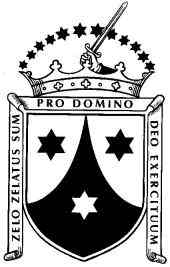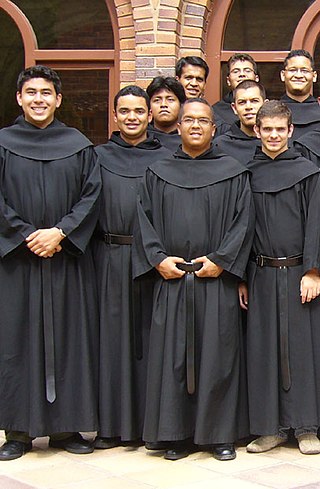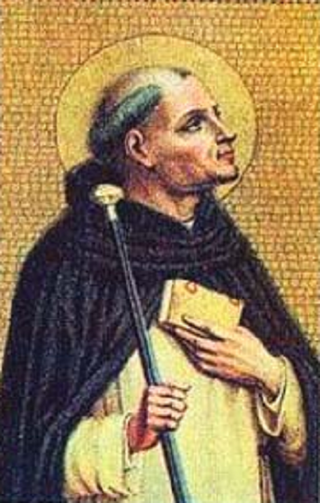Historical context
Pope John XXI employed Jerome of Ascoli, Minister General of the Franciscans, and John of Vercelli, Master of the Dominicans, as mediators in the war between Philip III of France and Alfonso X of Castile. This embassy occupied both Superiors till March, 1279, although Jerome was preferred to the cardinalate on 12 March 1278. When Jerome departed on the embassy to the Greeks, he had appointed Bonagratia to represent him at the General Chapter of Padua in 1276. On 20 May 1279, he convened the General Chapter of Assisi, at which Bonagratia was elected Minister General.
Bonagratia conducted a deputation from the chapter before Pope Nicholas III, who was then staying at Soriano, and petitioned for a cardinal-protector. The Pope, who had himself been protector, appointed his nephew Matteo Orsini. He also asked for a definition of the rule of the Order, which the pope, after personal consultation with cardinals and the theologians of the order, issued in the Exiit qui seminat of 14 August 1279. In this the order's complete renunciation of property in communi was again confirmed, and all property given to the brothers was vested in the Holy See, unless the donor wished to retain his title. All moneys were to be held in trust by the nuntii, or spiritual friends, for the friars, who could however raise no claim to them. The purchase of goods could take place only through procurators appointed by the pope, or by the cardinal-protector in his name.
The Bull of Pope Martin IV Ad fructus uberes (13 December 1281) defined the relations of the mendicants to the secular clergy. The mendicant orders had long been exempt from the jurisdiction of the bishop, and enjoyed (as distinguished from the secular clergy) unrestricted freedom to preach and hear confessions in the churches connected with their monasteries. This had led to endless friction and open quarrels between the two divisions of the clergy, and, although Martin IV granted no new privileges to the mendicants, the strife now broke out with increased violence, chiefly in France and in a particular manner at Paris.
In the Bull Exultantes of 18 January 1283, Martin IV instituted the syndici Apostolici. This was the name given to the men appointed by the ministers and custodians to receive in the name of the Holy See the alms given to the Franciscans, and to pay it out again at their request. The syndici consequently replaced the nuntii and procurators. All these regulations were necessary in consequence of the rule of poverty, the literal and unconditional observance of which was rendered impossible by the great expansion of the Order, by its pursuit of learning, and the accumulated property of the large cloisters in the towns. The appointment of these trustees, however, was neither subversive of nor an evasion of the rule, but rather the proper observance of its precepts under the altered conditions of the time.
Under Bonagratia, and his immediate successors, the Spiritual movement broke out in the Province of Ancona, under the leadership of Pietro da Macerata. [2]

The Order of the Brothers of the Blessed Virgin Mary of Mount Carmel, known as the Carmelites or sometimes by synecdoche known simply as Carmel, is a Roman Catholic mendicant religious order for men and women. Historical records about its origin remain uncertain, but it was probably founded in the 12th century on Mount Carmel in the Crusader States. Berthold of Calabria, as well as Albert of Vercelli, have traditionally been associated with the founding of the order, but few clear records of early Carmelite history have survived. The order of Carmelite nuns was formalised in 1452.

Pope Nicholas IV, born Girolamo Masci, was head of the Catholic Church and ruler of the Papal States from 22 February 1288 to his death, on 4 April 1292. He was the first Franciscan to be elected pope.

The Franciscans are a group of related mendicant Christian religious orders within the Catholic Church. Founded in 1209 by the Italian saint Francis of Assisi, these orders include three independent orders for men, orders for nuns such as the Order of Saint Clare, and the Third Order of Saint Francis open to male and female members. They adhere to the teachings and spiritual disciplines of the founder and of his main associates and followers, such as Clare of Assisi, Anthony of Padua, and Elizabeth of Hungary. Several smaller Protestant Franciscan orders exist as well, notably in the Anglican and Lutheran traditions.

Augustinians are members of several religious orders that follow the Rule of Saint Augustine, written in about 400 AD by Augustine of Hippo. There are two distinct types of Augustinians in Catholic religious orders dating back to the 12th–13th centuries:
The Fraticelli or Spiritual Franciscans opposed changes to the rule of Saint Francis of Assisi, especially with regard to poverty, and regarded the wealth of the Church as scandalous, and that of individual churchmen as invalidating their status. The Fraticelli were declared heretical in 1296 by Boniface VIII.
Michael of Cesena was an Italian Franciscan, minister general of that order, and theologian. His advocacy of evangelical poverty brought him into conflict with Pope John XXII.

A friar is a member of one of the mendicant orders of the Roman Catholic church. The term, first used in the 12th or 13th century, distinguishes the mendicants' itinerant apostolic character, exercised broadly under the jurisdiction of a superior general, from the older monastic orders' allegiance to a single monastery formalized by their vow of stability. A friar may be in holy orders or be a brother. The most significant orders of friars are the Dominicans, Franciscans, Augustinians, and Carmelites.

Munio of Zamora, O.P., was a Spanish Dominican friar who became the seventh Master General of the Dominican Order in 1285, and later a bishop.
Apostolic poverty is a Christian doctrine professed in the thirteenth century by the newly formed religious orders, known as the mendicant orders, in direct response to calls for reform in the Roman Catholic Church. In this, these orders attempted to live their lives without ownership of lands or accumulation of money, following the precepts given to the seventy disciples in the Gospel of Luke (10:1-24), and succeeding to varying degrees. The ascetic Pope Paschal II's solution of the Investiture Controversy in his radical Concordat of 1111 with the Emperor, repudiated by the cardinals, was that the ecclesiastics of Germany should surrender to the imperial crown their fiefs and secular offices. Paschal proved to be the last of the Gregorianist popes.

The Order of Friars Minor Conventual (O.F.M.Conv.) is a male religious fraternity in the Catholic Church and a branch of the Franciscan Order. Conventual Franciscan Friars are identified by the affix O.F.M.Conv. after their names. They are also known as Conventual Franciscans or Minorites.
Francis of Assisi founded three orders and gave each of them a special rule. Here, only the rule of the first order is discussed, i.e., that of the Order of Friars Minor.

John of Vercelli was the sixth Master General of the Dominican Order (1264-1283).
An Apostolic Syndic is a Catholic layman, who in the name, and by the authority, of the Holy See, assumes the care and civil administration of the temporalities and in particular the pecuniary alms destined for the support and benefit of Franciscan convents, and thence provides for the requirements of the brethren.
John of Parma was an Italian Franciscan friar, who served as one of the first Ministers General of the Order of Friars Minor (1247–1257). He was also a noted theologian of the period.
Bonagratia of Bergamo was a Franciscan involved in the "poverty of Christ" controversy. As a trained canonist, he supported Michael of Cesena against Pope John XXII.

Matthew of Aquasparta was an Italian Friar Minor and scholastic philosopher. He was elected Minister General of the Order.

Clemente d'Olera was an Italian Roman Catholic who became Minister General of the Order of Friars Minor, cardinal and bishop.

The Order of Friars Minor is a mendicant Catholic religious order, founded in 1209 by Francis of Assisi. The order adheres to the teachings and spiritual disciplines of the founder and of his main associates and followers, such as Clare of Assisi, Anthony of Padua, and Elizabeth of Hungary, among many others. The Order of Friars Minor is the largest of the contemporary First Orders within the Franciscan movement.
Paul of Segni was an Italian nobleman and Franciscan friar who served as the bishop of Tripoli in the Levant from 1261 until 1285 and as a papal legate to the kingdoms of Germany and Sicily in 1279–1280. He was the most prominent churchman from the east at the Second Council of Lyon in 1274. After 1275, he was involved in a dispute with the bishop of Tortosa that took him to Rome. He spent his last five years in Italy.










